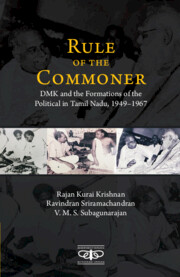4 - Left Populism
Published online by Cambridge University Press: 15 June 2022
Summary
… the central axis of the political conflict willbe between right-wing populism and left-wingpopulism … it is through the construction of apeople, a collective will that results from themobilization of affects in defense of equality andsocial justice, that it will be possible to combatthe xenophobic policies promoted by right wingpopulism.
—Chantal Mouffe, For ALeft PopulismPhilip Spratt, aged twenty-four, arrived in India inDecember 1926. He was a member of the BritishCommunist Party sent to India by the Comintern (theCommunist International) to found and guide theactivities of the Communist Party in India. He wasinstrumental in founding the front organizationWorkers and Peasants Party (WPP) and was guiding theactivities of the party and trade unions. He wasarrested in 1929 and subsequently convicted in whatcame to be known as the Meerut conspiracy case. Histwelve-year sentence was later reduced to two yearsand he was released in 1934. By that time, he hadturned very critical of the Comintern, whichdictated the activities in India without a properappreciation of ground realities. He becamedisillusioned with communism, moving gradually tosupport market economy and liberal democracy. Herecorded his experiences in 1955 in a book with thetell-tale title Blowing UpIndia: Reminiscences and Reflections of a FormerComintern Emissary (Spratt 1955).However, what interests us here is his last bookpublished in 1970, a year before his death,succinctly titled The DMK inPower (Spratt 1970).
Spratt developed a Tamil Nadu connection in the 1930swhen he married the grandniece of MalayapuramSingaravelu Chettiar, popularly called Singaravelar(1860–1946), one of the founding figures of thecommunist movement from Tamil Nadu, who was also aclose associate of Periyar in the 1930s. Sprattinitially moved to Bangalore, where he became theeditor of Mysindia, apro-American journal. He later moved to Chennai andbecame the editor of Swarajya, a magazine run by C.Rajagopalachari, who was heading the SwatantraParty, which was extremely critical of the Congressbrand of socialism and state control. It should beborne in mind that Rajagopalachari was in support ofthe DMK since the late 1950s in its opposition tothe Congress in Tamil Nadu.
- Type
- Chapter
- Information
- Rule of the CommonerDMK and Formations of the Political in Tamil Nadu, 1949–1967, pp. 85 - 102Publisher: Cambridge University PressPrint publication year: 2022



